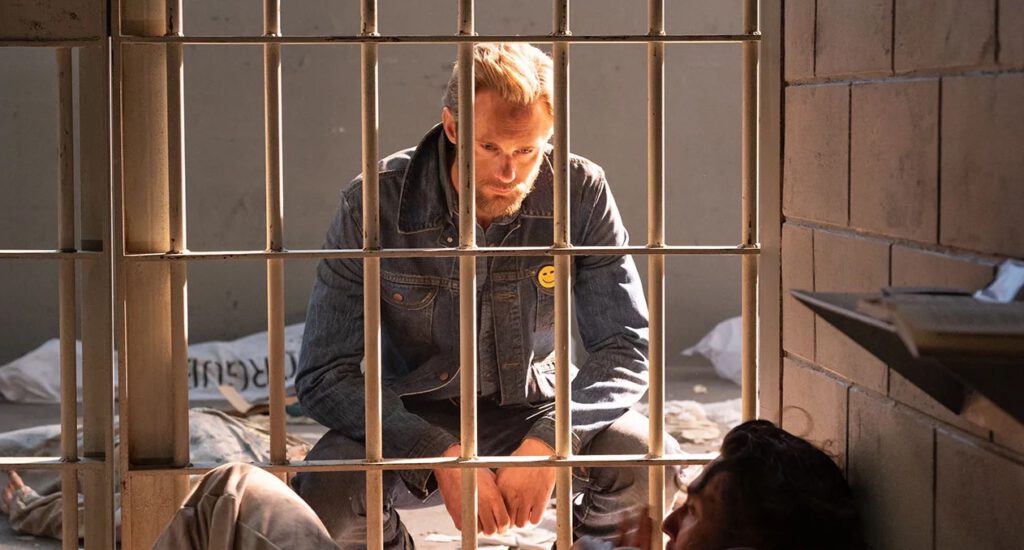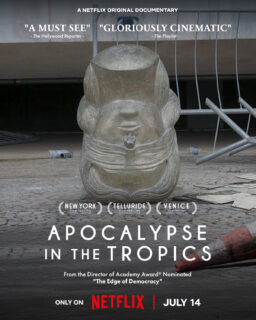“Do you think he’s still alive?” a man asks a new friend. Then he clarifies: “The Rock?” The pair look down at what the man holds: a copy of, of all things, “Skyscraper.” It’s both punchline and lament, one moment among many in which the characters of “The Stand” confront their new reality. Is The Rock still alive? Probably not. Like 99 percent of humanity, it’s likely that he succumbed to the virus known colloquially as Captain Trips, a government-developed superflu inadvertently unleashed upon the world by a scared man who just wants to keep his wife and kid safe. And as a moment of drama, it’s an unlikely high point in Josh Boone and Benjamin Cavell’s adaptation of Stephen King’s seminal dark fantasy novel. The world ends, and that’s a wrap on The Rock as we understand him; all our old institutions of wealth, fame, and power have crumbled. It’s surreal and sad, a punchline and a moment of grief in one, and then it passes, and it’s time to get back to work hauling corpses.
I’ll admit that the “Skyscraper” moment almost doesn’t work—the writers are in on the joke, but the character is not, and it rankles a bit—but all the same, it’s hard not to wish for more such moments in this take on “The Stand.” Any King adaptation lives and dies by its characters. The character development in this adaptation, the first episode of which arrives this week via CBS’ streaming service, is a hell of a mixed bag, and that’s true of the miniseries as a whole. It’s a sometimes dazzling, often frustrating, and undeniably assured effort that swings hard and occasionally connects. When it does, it’s riveting television; when it doesn’t, well, it’s not boring.

For the uninitiated, “The Stand” centers on a good old-fashioned battle between good and evil, writ large against the backdrop of a world devastated by a pandemic. King’s sprawling novel is home to a lengthy cast of characters, and one of the most compelling, both on the page and in this adaptation, is Harold Lauder. One of the biggest changes Boone and Cavell, the latter of whom serves as showrunner, make to the narrative is an early focus on Harold, here played with complexity and gusto by Owen Teague. When we meet him, he’s on the body-dumping crew in a peaceful settlement in Boulder, where a group of survivors have gathered to attempt to jumpstart humanity, among them: Stu Redman (James Marsden), who begins his pandemic journey trapped inside a government facility full of people who are dropping like flies; Franny Goldsmith (Odessa Young), a young woman on whom Harold is unhealthily fixated, and that’s only one of her problems, thanks; Larry Underwood (Jovan Adepo), a singer-songwriter whose ascent up the pop charts is interrupted when most of the music-lovers of the world drown in their own mucus; Nick Andros (Henry Zaga), a gentle guy whose deafness makes it difficult to communicate with his travel buddy Tom (Brad William Henke), a sweet guy with a developmental disability who can’t read; vape-loving professor Glen (Greg Kinnear); and Nadine (Amber Heard), whose inner turmoil far predates Captain Trips.
Most of those folks keep having the same dream—an old woman in a cornfield (Whoopi Goldberg), beckoning them to Boulder. But there are other dreams as well—a malevolent figure (Alexander Skarsgård) who’s set up shop in Vegas and promptly sets out to recruit folks like Lloyd (Nat Wolff, incredibly game), a mass murderer who’s behind bars when the disease strikes, and Julie (Katherine McNamara), a sociopath wandering the countryside in a prom dress. It is, as you may have guessed, a lot. And that’s just the main players. If there’s one undeniably excellent thing about this adaptation, it’s casting director Avy Kaufman’s commitment to stacking the deck; this is a series where folks like Hamish Linklater show up for a handful of scenes, then clock out, knowing full well that they nailed it. There’s the odd off-note—Heard in particular seems ill-suited to her role—but for the most part it’s a powerhouse ensemble, with Teague as a standout, playing the budding MRA rage machine with clarity and without vanity. When “The Stand” stumbles, and it does, it’s rarely because of the actors.
It’s not the source material, either. The best King adaptations prioritize character over all else, and that’s what Boone and Cavell attempt here, transforming the book’s linear, long-road structure into a “Lost”-inspired back and forth between past and present, with the scenes in Boulder and Vegas (places readers take quite awhile to reach) interspersed with flashbacks to how the characters met up, survived, and eventually reached their destinations. It’s a clever idea, obviously intended to tell as much of King’s story as possible without committing to a ten-season arc, but it inadvertently robs the story of its potency. We see who’s in Boulder, so the danger of the journey is inherently diminished; we meet the characters after they’ve established new relationships, and the pleasure of seeing them develop is greatly lessened.

Most damningly, there’s no sense of the world’s descent into madness, no seeping dread, no unbearable builds of tension; “The Stand” hits you with the glowing eyes of evil and the mystical wisdom of the “magical old black lady” (the show’s description, not mine) early and often, leaving subtlety in the dust. When the onset of the apocalypse is treated with more subtlety on “The Walking Dead” than in “The Stand,” something has gone terribly wrong.
Still, it’s sometimes effective, and when Cavell and company anchor themselves in one time or place for an extended stay, the show comes into focus. Not all the writing, nor the direction, is stellar—the first episode, directed by Boone, is the tightest in terms of writing but visually falls flat, while some solid, tense scenes get punctured by on-the-nose dialogue, with a nightmarish roadside encounter nearly tanked by a line about “beta-male snowflakes.” So not all the choices work, but there’s still much to enjoy. (Cheers in particular to music supervisor Season Kent for the year’s best needle-drops.) The miniseries is set to conclude with a coda written by Sai King himself, and die-hard Constant Readers will likely stick around for that regardless, but even those new to the story will likely find reasons to stick around. If nothing else, “The Stand” may cast our current situation in a different light; things are bad, but hey, they could definitely get worse.
Six episodes screened for review.












